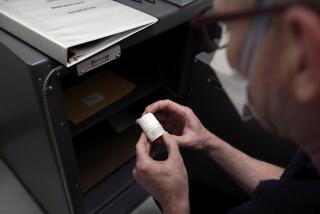Crime Panel Member Scores Drug Tests
- Share via
WASHINGTON — A California member of the President’s Commission on Organized Crime Wednesday criticized the commission’s recommendations for drug testing of federal employees and for those working for government contractors.
Thomas F. McBride, associate dean of the Stanford Law School, said that he had not been told of the recommendation before it was made and that “the wholesale nature of the recommendation goes far beyond what I could support.”
McBride said in a telephone interview that the panel’s action “reveals one of the commission’s major shortcomings: the failure to have meetings to adequately review” its findings. He said he had recommended that specific changes be made in an early draft of the report but had never seen the final version.
‘A Few Dissenters’
The panel’s chairman, federal appeals Judge Irving R. Kaufman, was asked at a press conference Tuesday whether there was “unanimity” on the drug testing recommendation. “Pretty much,” he replied. “I think we had . . . more unanimity on the drug report than we had probably on the others (reports the commission has issued). It’s like any other court: You have a few dissenters, and then you win them over.”
None of the other 12 commissioners present at the press conference, which McBride did not attend, attempted to express a different view.
Arthur P. Brill Jr., a commission spokesman, said Wednesday night that Kaufman’s response “did not mean that commission members did not object” to the recommendation. He said he did not know if any had, adding: “Most of our recommendations have not been unanimous.”
McBride’s opposition, which he expressed in a telephone call that he initiated, followed strong criticism of the drug testing recommendation by the American Civil Liberties Union; Kenneth T. Blaylock, president of the 210,000-member American Federation of Government Employees, and several members of Congress.
McBride said that a draft of the drug trafficking report sent him in late January contained a recommendation for both government and private sector employers to consider a testing program for applicants and employees.
Appropriate Testing
In response, McBride said, he called Rodney G. Smith, the commission’s deputy executive director, whom Brill described as “author of the report,” to ask that the recommendation “be narrowed in some way.” McBride said he spoke of some “safety-sensitive” jobs where testing would be appropriate and of other situations where it would not be.
He said that Smith, who could not be reached for comment Wednesday, “assured me those changes would be made” in the draft, which “spoke to the need for federal, state and local government leadership to have clear policies on the unacceptability of drug use,” a position with which McBride said he agreed.
But, in the final report, “two phrases were added to that recommendation without my prior knowledge,” McBride said. They called for heads of federal agencies to implement “suitable drug testing programs” and for government contracts not to be awarded to companies that “fail to implement drug programs, including suitable drug testing.”
More to Read
Get the L.A. Times Politics newsletter
Deeply reported insights into legislation, politics and policy from Sacramento, Washington and beyond. In your inbox twice per week.
You may occasionally receive promotional content from the Los Angeles Times.










